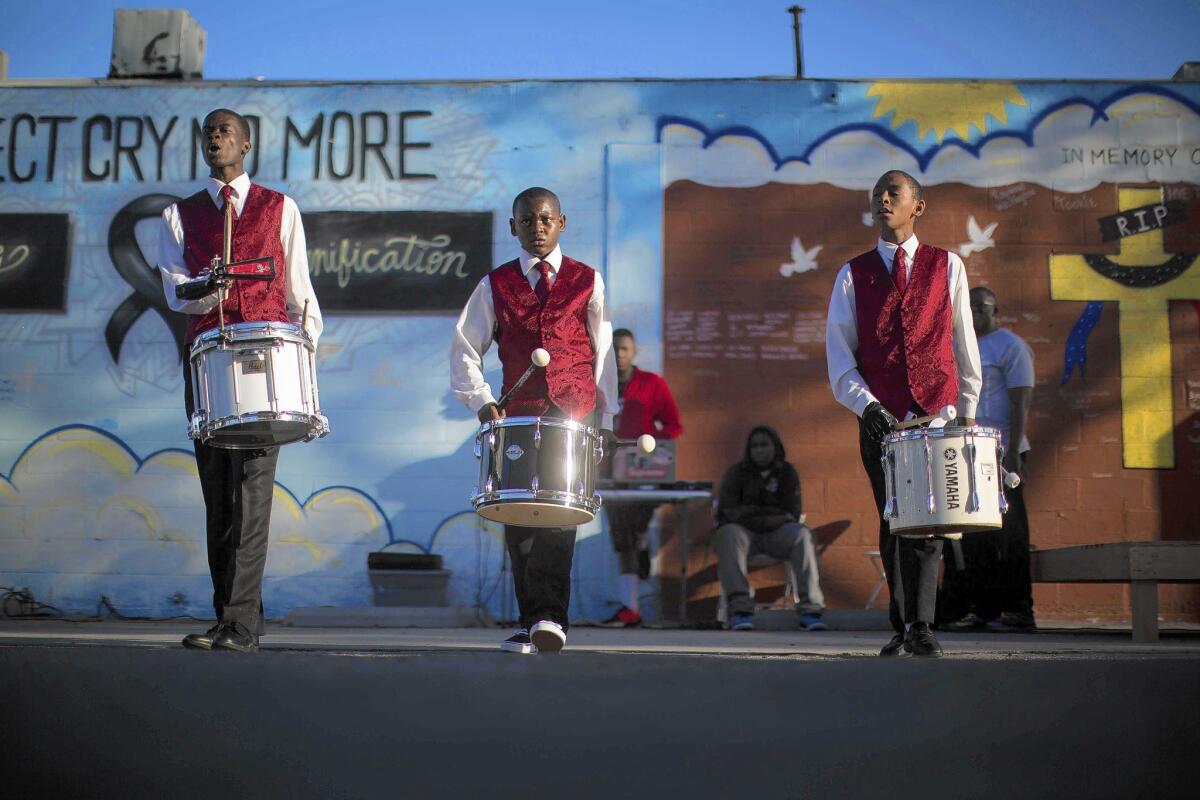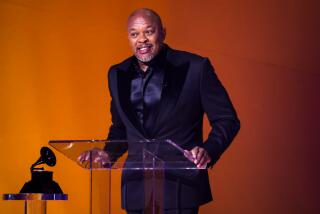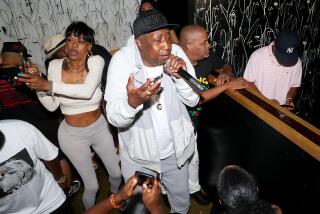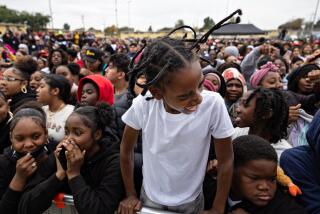Compton reassesses native son Dr. Dre, a newly minted billionaire

Every fall, economics teacher Louis Stewart puts aside the textbooks and gives his students at Centennial High School in Compton a lesson in Dr. Dre 101.
He pulls out the Forbes magazine list of America’s richest celebrities and points to Dr. Dre, who is usually high on the list. Most of his students assume the only way a Compton native could have become so wealthy is through professional sports, Stewart says, “because that’s all they know.”
Stewart explains Dre’s rise from the streets of Compton to rapper to music producer to co-founder of Beats Electronics, the high-end, bass-heavy headphone and speaker company.
With Apple Inc.’s recent purchase of Beats for $3 billion, Dre (real name: Andre Young) is now being hailed around town as Compton’s first billionaire and an even more powerful role model in a community where opportunities for young people often seem few and far between.
The milestone is also prompting some to reassess their feeling for Dre, who at times in his career has been a divisive figure in his hometown.
Some in the community blamed Dre and his N.W.A bandmates for casting the city in a bad light. Their 1988 debut album, “Straight Outta Compton,” chronicled the plight of living in one of the most dangerous cities in the U.S. It was dark, and the graphic lyrics were laced with violence and rage.
For years, Compton tried to shed the image as a birthplace of West Coast gangsta rap. It spent millions of dollars hosting an annual gospel festival in an effort to become the gospel music center. The wildly popular event brought gospel performers from across the country.
In recent years, however, these concerns have faded as Dre emerged as a successful businessman who left his gangsta rap past behind.
Compton Mayor Aja Brown, no fan of gangsta rap, recently offered Dre a key to the city. Like Stewart, she sees Dre as an inspiration for the city and its youth.
“It’s a source of pride for the community that someone could come from such humble beginnings and reach a considerable level of success — and not necessarily for his artistry — but for his business acumen and really being an entrepreneur,” Brown said.
In the past, Brown has shied away from honoring Compton-bred rappers and athletes. She said she did not want youngsters to view music and sports as the only pathways out.
But Dre is different, she said. Because it was his business sense that propelled his success.
“The majority of people, especially young people, know Dr. Dre because of Beats by Dre, not necessarily from him being a rap artist,” she said. “That was over 20 years ago. They see Mr. Young as a businessperson and entrepreneur.”
Dre hasn’t actually lived in Compton in nearly three decades. He moved to Westlake Village in the late 1980s. Around that time, his Mercedes was stolen at gunpoint in Inglewood. He told reporters at the time that living in “dangerous places” affected his mental state and he had “to get out to keep [his] sanity.”
Days after selling Beats, Dre bought a $40-million Brentwood compound previously owned by supermodel Gisele Bundchen and New England Patriots quarterback Tom Brady. Then he put his current Hollywood Hills West home on the market for $35 million. Dre has described himself as the “first hip-hop billionaire,” though Forbes magazine has estimated his net worth at $700 million to $800 million after the Beats sale.
Brown has tried to reach out to Dre through the president of USC, her alma mater and where Dre has funded an academy for the arts. She has not received a response yet, but she’s hopeful.
Some Compton residents, however, have taken matters into their own hands. Sylvia Nunn Angels, a grass-roots organization aimed at reducing gang violence, threw a tribute for Dre last month, proclaiming June 19 Dre Day.
That evening, about 30 people converged on an empty blacktop on Long Beach Boulevard for a party in his honor. Dre’s tunes blasted from the speakers, and the smell of chili and barbecue filled the air.
Some guests wore T-shirts with Dre’s face under the title “Compton’s First Black Billionaire.” The deejay for the event was 15-year-old Chris Desrosiers.
Over the blare of the music, he explained that Dre was an inspiration for him.
“I want to be like him,” said Chris, a student at King Drew Medical Magnet High School. “But I’m going to get my business degree first.”
Dre got his start as a deejay before forming N.W.A with four local musicians, including rapper-turned-actor Ice Cube, in the 1980s.
As the group’s producer, he was the architect behind N.W.A’s hard-core rap sound that was known as gangsta rap. A media storm erupted over the explicit content in N.W.A’s 1988 hit “F— tha Police.” Parent groups tried to ban the album from stores. The FBI issued a “warning letter” to the rap group’s record label, saying the song encouraged “violence against and disrespect” for law enforcement officers.
Stewart, the economics teacher, said Compton’s image changed from that of a working-class area to “this perception of gangsta land, and N.W.A had a lot to do with that.”
“I’m a fan of Dr. Dre and Ice Cube, but their music affected Compton,” he added. “They all mentioned Compton by name in their songs, and it changed people’s perception.”
In the early 1990s, Dre got in trouble with the law and spent time in jail for a probation violation. He’s said in interviews that his time behind bars changed him. He slowly moved away from the gangsta rap culture, focusing more on producing music and developing new artists. He’s now considered one of the music industry’s legendary producers.
In 2008, Dre and longtime business partner Interscope Geffen A&M Chairman Jimmy Iovine released the first pair of Beats by Dre headphones.
Last year, Dre and Iovine established a $70-million endowment at USC to create the USC Jimmy Iovine and Andre Young Academy for Arts, Technology and the Business of Innovation — to train those interested in the music technology business. The gift drew praise from many quarters. But some critics questioned why Dre gave to the private university rather than to historically black colleges or even high schools in his hometown.
Dre’s spokeswoman, Susie Arons, said the rapper-producer was not conducting interviews at this time.
Officials and activists in Compton now hope Dre will become more of a force in the city. Dre did not attend the party in his honor last month. But the community group honored him anyway with an award.
Said community activist Marvin Kinsy, who led the award ceremony: “Dre continues to put the city on the map.”
Twitter: @LATangel
More to Read
Start your day right
Sign up for Essential California for news, features and recommendations from the L.A. Times and beyond in your inbox six days a week.
You may occasionally receive promotional content from the Los Angeles Times.







